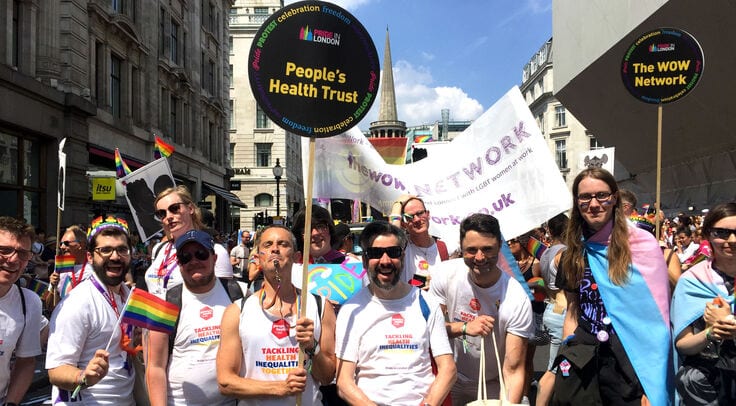
In this blog, we hear from our People's Health Trust's Chief Executive, John Hume, on the importance of Pride, as our team get ready to celebrate and support the LGBT+ community at Pride in London.
“It’s the week before Pride in London and the team here is getting ready to go on the march and show our solidarity with the LGBT+ community as well as our commitment to making health fairer.
Pride events are happening up and down the country and internationally throughout June and July. London, New York and Toronto often grab the headlines because of their sheer numbers and because of their association with large cities. But there are a lot of smaller towns and cities up and down the country which are holding their own Pride events. They’re not huge, they don’t have a lot of cash and they don’t necessarily have the support locally. In many ways, I think this is what Pride should be about: standing up, being visible, challenging inequality. And doing this when there’s no precedent and there’s no visible support.
Pride is political - it can be fun too, but it’s still political. And it needs to be. Look around the high street, across the internet and social media and you will see ever-increasing numbers of Pride flags flying, of brands using the Pride colours, or rainbow trainers, football teams with their Pride laces. This is all heartening, but what does this add up to when we are seeing LGBT+ hate crime rising by 144% (from 2013/14 compared to 2017/18)[1] and a trebling in transphobic attacks? Seeing the images and hearing the story of Melania Geymonat and her girlfriend, Chris, the lesbian couple who were attacked on a London bus, was shocking to some…but I suspect not surprising to the LGBT+ community.
A friend of a friend remarked to me last year that the LGBT+ community make a lot of noise for making up only 2% of the population. My response: the stats speak volumes. Stonewall’s report in 2017 noted that 21% of LGBT and 41% of trans people had experienced hate crime in the previous 12 months. The friend of a friend’s comment was incensing but not unusual. Believe me, LGBT+ people would like nothing more than to just get on with their lives but instead have to continue to make noise to be treated anywhere near approaching equal.
The underlying threat of never being far away from hateful comments or unwanted advances invades your life, affecting your joy in the usual pleasures and freedoms that other people can take for granted. Three in ten LBGT people avoid certain streets because of safety issues and 36% say they don’t feel comfortable walking down the street while holding their partner’s hand. If you’re a gay man, this figure increases to 58%.
In May of this year, the Trade Union Congress (TUC) published its first major report into LGBT+ harassment at work. Aside from the question of what took them so long to do this, it was hard reading. Out of 1001 LGBT+ respondents, a shocking 68% said they have been sexually harassed at work - from unwelcome comments or questions about their sex lives, to sexual verbal advances. Women, minority ethnic women and disabled men and women more likely to experience harassment and sexual assault.
What strikes me is that there’s a disconnect here - between these shameful statistics and the almost frenzied ‘gay-washing’ going on by companies and brands. If the rhetoric of equality within the workplace were true, we wouldn’t be seeing such statistics – and this is why, 50 years on from Stonewall, we still need to take to the streets to shout.
History has consistently denied LGBT+ people a place or has allowed the place but denied the LGBT+ status. And it feels like we are entering a time when that is happening again worldwide. We’ve seen a move against LGBT+ people in the US under the Trump government and in the last few days, we have seen Putin declare that liberalism is obsolete and preferring to pitch LGBT+ people against “the culture, traditions and traditional family values”. These sentiments only further fuel hatred and discrimination and, I fear, set the tone for things to come.
Of course, I don’t underestimate that, comparatively, the UK’s position is better than other countries around the world. Relatively speaking, we are more fortunate – and more people than ever are identifying as LGBT+[2], but the inequality is here and now – and it’s stubborn. So, to my friend of a friend I say this, as long as this inequality, this discrimination, this bullying and this harassment continues - as long as people don’t feel able to walk their own streets or ride a bus without fear of attack - as long as all this continues, this 2% will continue to shout and make noise. And to the companies flying the Pride colours, I say thanks…but make this a way of working throughout the year and not just for the month of June.”
This Saturday, the Trust will join funded projects Rainbow Films, Transpire Southend and The Centre Place to march in the Pride in London parade. Click here to read more.
[1] ‘LGBT in Britain – Hate Crime and Discrimination’. Bachmann, C. L; Gooch, B. 2017. https://www.stonewall.org.uk/system/files/lgbt_in_britain_hate_crime.pdf
[2] ‘Sexual orientation, UK: 2017’. Office of National Statistics. 2017. https://www.ons.gov.uk/peoplepopulationandcommunity/culturalidentity/sexuality/bulletins/sexualidentityuk/2017
